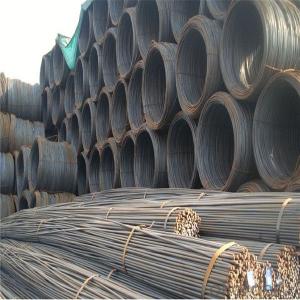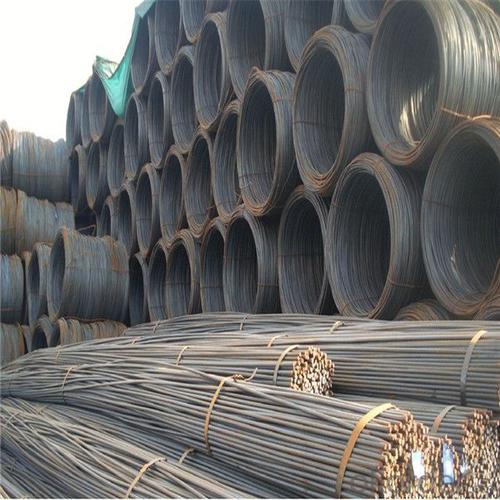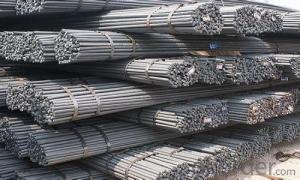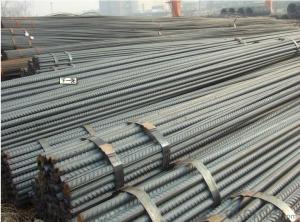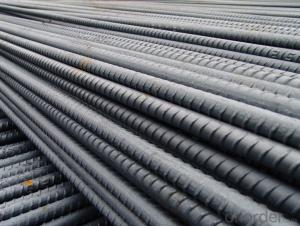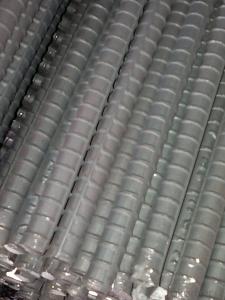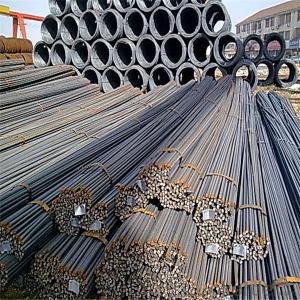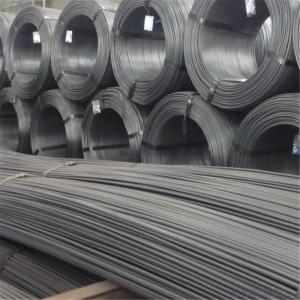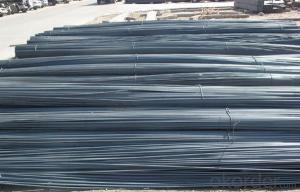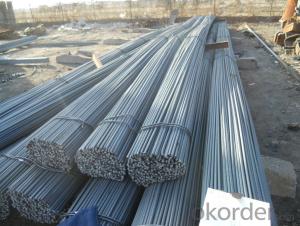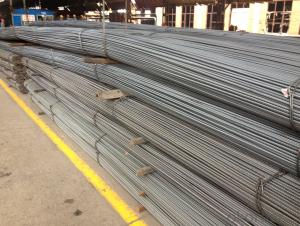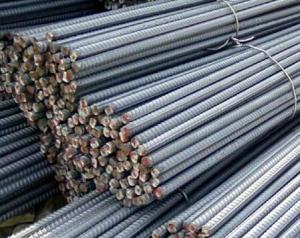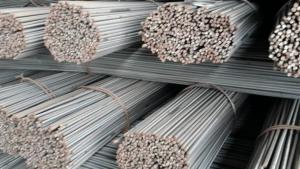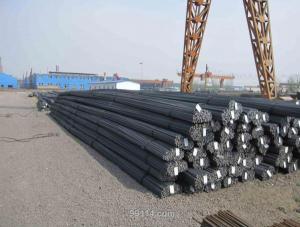Reinforced Rebar Steel for Construction building bridge road
- Loading Port:
- Shanghai
- Payment Terms:
- TT OR LC
- Min Order Qty:
- 100 m.t.
- Supply Capability:
- 19000 m.t./month
OKorder Service Pledge
OKorder Financial Service
You Might Also Like
Specification
Rebar (short for reinforcing bar), also known as reinforcing steel, reinforcement steel, is a steel bar or mesh of steel wires
used as a tension device in reinforced concrete and reinforced masonry structures to strengthen and hold the concrete in tension.
Rebar's surface is often patterned to form a better bond with the concrete.
Features
1、Pure steel quality, stable chemical contents, small tolerance.
2、Constant Quality, good drawing performance.
3、High dimension accuracy degree, accuracy degree of Level C up to 80%, smooth surface, less scale, easy to be pickled.
4、Automatic bundling with 4 lines by Machine in tidy and good looks
5、Big high quality percentage, small coil percentage, and heavy coil weight for Hard Coil.
6、High sorbitizing percentage.
Product Description :
Chemical composition (%): | Steel | C | Si | Mn | P | S | Ceq | ||||
HRB335 |
0.25 |
0.80 |
1.60 |
0.045 |
0.045 | 0.52 | |||||
HRB400 | 0.54 | ||||||||||
HRB500 | 0.55 | ||||||||||
Mechanical properties | Steel | Rel/ MPa | Rm/ MPa | A/ % | Agt/ % | ||||||
≥ | |||||||||||
HRB335 | 335 | 455 | 17 |
7.5 | |||||||
HRB400 | 400 | 540 | 16 | ||||||||
HRB500 | 500 | 630 | 15 | ||||||||
Package: | Standard export packing or as customer's request | ||||||||||
Application: | Construction, building, bridge, road. ect | ||||||||||
Payment terms | 1).100% irrevocable L/C at sight. | ||||||||||
Delivery time | 15-30 days after receipt of L/C or deposit by T/T | ||||||||||
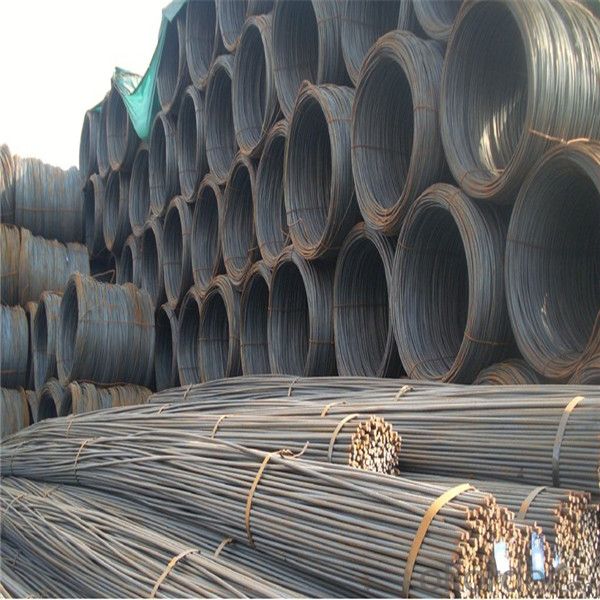
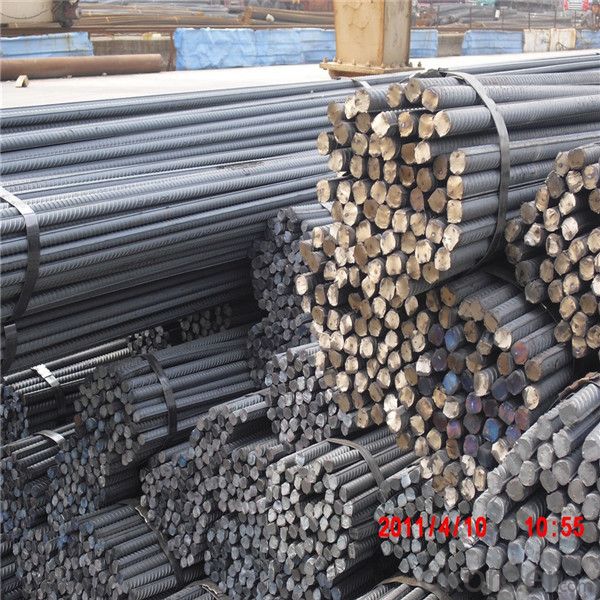
Packing:
In bundles, each bundle weight 3.5 tons. Load by container or by bulk verssel.
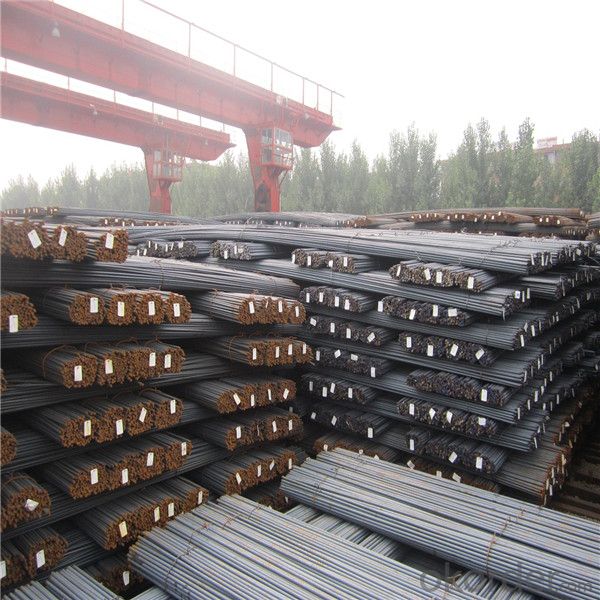
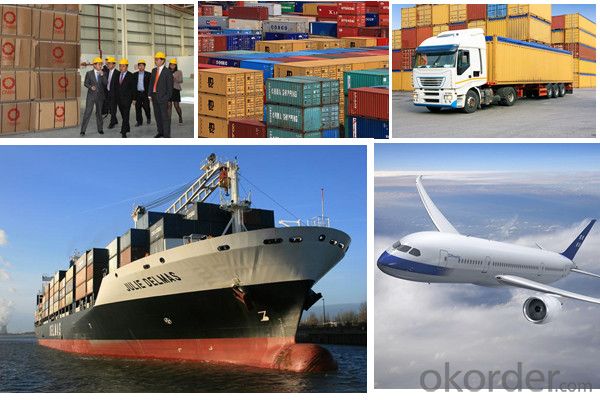
Our service
(1) We cooperate with famous factories with advanced equipment and well trained workers.
(2) We can provide factory price with trading company service.
(3) We continuously work on the improvement of our processes, guaranteeing consistently high standards
of quality to keep none compensation.
(4) We guarantee 24 hours response and 48 hours solution providing service.
(5) We accept small order quantity before formal cooperation.
(6) We deliver the agreed quality at the agreed time, reacting to changes in customer wishes in a flexible way.
(7) Due to our volume and selling power, we have excellent freight rates with shipping lines.
(8) We strive to always be fair and honest in our dealings with customers.
(9) We strive to work together with customers to achieve much more than we can achieve alone.
(10) Through our passion and commitment we aim to be a market leader in all our key markets. To maintain
our position as market leader we must continue to add value in all that we do.
FAQ:
1.Q: What's your MOQ(minimum order quantity)?
A: One full container, mixed acceptable .
2. Q: What's your packing methods?
A: Packed in bundle or bulk ..
3. Q: How can I buy CNBM products in my country?
A:Please send us an inquiry or email ,we will reply to you if there is distributor in your country
4. Q: Can we visit your factory?
A: Warmly welcome. Once we have your schedule, we will arrange the professional sales team to follow up your case.
5. Q: How long does it take to get the product if i place an order?
A:With the process of your requirements,we will pack and deliver in 3-7 days. If it is by sea shipment,it will take 15-45 days depending on different locations
- Q: Can steel rebars be used in structures with curved or irregular shapes?
- Yes, steel rebars can be used in structures with curved or irregular shapes. Steel rebars are highly flexible and can be bent or shaped to fit the desired form of the structure. They are commonly used in reinforced concrete structures, which often require curved or irregular shapes to meet architectural or structural design requirements. The rebars are typically bent or cut to the required shape and then securely anchored in place to provide strength and reinforcement to the structure. This allows for the construction of structures with complex shapes and designs, while still ensuring structural integrity and durability.
- Q: What are the guidelines for the proper spacing of steel rebars in columns?
- The guidelines for the proper spacing of steel rebars in columns typically depend on the specific design requirements and structural code regulations. However, common recommendations suggest placing rebars at a minimum distance of three times the diameter of the largest bar or 1.5 times the diameter of the smallest bar. This spacing ensures adequate concrete cover and allows for proper consolidation and strength development. It is crucial to consult the structural engineer or refer to the applicable building codes for precise guidelines.
- Q: How do steel rebars affect the aesthetics of a construction project?
- Steel rebars, an essential element of reinforced concrete structures, have a significant influence on the aesthetics of construction projects. Although their primary purpose is to provide strength and reinforcement to concrete, their presence can have an impact on the overall appearance of the project. The visibility of steel rebars is one way they affect aesthetics. In infrastructure projects like bridges or parking garages, it is common to leave rebars exposed during construction. This exposure can create a distinct industrial or modern look that some find aesthetically pleasing. Architects and designers may intentionally embrace this raw and utilitarian appearance to achieve a specific aesthetic vision. However, in many architectural projects, particularly those involving residential or commercial buildings, the visibility of steel rebars is often undesirable. In such cases, rebars are typically concealed within the structure and covered with finishes such as concrete, plaster, or decorative cladding. This approach enhances the aesthetics of the construction project by shifting the focus from structural elements to the overall design and finishes. Furthermore, the placement and arrangement of rebars can also impact aesthetics. In intricate architectural designs, rebars must be precisely positioned to ensure the desired structural integrity. This presents challenges for designers as they strive to achieve functionality and visual appeal. However, with careful planning and coordination, rebars can be strategically placed to minimize their visual impact while maintaining the desired aesthetics of the project. It is important to note that aesthetics should never compromise the safety and structural integrity of a construction project. While efforts can be made to conceal or minimize the visual impact of steel rebars, proper installation and adherence to engineering standards must always take priority. Ultimately, the aesthetic impact of steel rebars on a construction project depends on the design intent, architectural style, and the balance between functionality and visual appeal.
- Q: How do steel rebars affect the constructability of a project?
- Steel rebars play a crucial role in the constructability of a project as they enhance the structural integrity, strength, and durability of concrete structures. By providing tensile strength to concrete, rebars help prevent cracking and ensure the overall stability of the project. Additionally, rebars facilitate the ease of construction by allowing for efficient reinforcement placement and alignment. Overall, steel rebars significantly contribute to the constructability and long-term performance of a project.
- Q: Can steel rebars be used in foundation structures?
- Steel rebars are capable of being used in foundation structures. They are frequently employed in reinforced concrete foundations to heighten the structure's strength and endurance. By bolstering the concrete's tensile strength, steel rebars effectively reinforce it. This is especially crucial in regions where the foundation may encounter substantial loads or seismic activity. To distribute the load and prevent cracking or failure, the rebars are usually positioned in a grid pattern within the concrete. In conclusion, the stability and longevity of foundation structures largely depend on the inclusion of steel rebars as an indispensable component.
- Q: What are the advantages of using high-strength steel rebars?
- There are several advantages of using high-strength steel rebars in construction projects. Firstly, high-strength steel rebars have a much higher yield strength compared to regular steel rebars. This means that they can withstand much greater tensile forces without deforming or breaking. This allows for the construction of structures that can handle heavy loads and forces, making them more durable and resistant to damage. Secondly, high-strength steel rebars have a smaller diameter compared to regular steel rebars, while still maintaining their strength. This means that they can be used in places where space is limited or where a smaller concrete cover is required. This makes them particularly useful in projects with complex designs or in areas with high seismic activity. Moreover, high-strength steel rebars offer increased cost-efficiency. Due to their higher strength, fewer rebars are needed in construction projects, which results in reduced material and labor costs. Additionally, the smaller diameter of high-strength steel rebars leads to less concrete being needed, further reducing costs. Another advantage of using high-strength steel rebars is their enhanced corrosion resistance. The increased strength of these rebars is often achieved by adding alloying elements, such as chromium or nickel, which improve their resistance to corrosion. This ensures that structures reinforced with high-strength steel rebars have a longer lifespan and require less maintenance over time. Lastly, the use of high-strength steel rebars allows for the construction of lighter and more slender structures. Their higher strength-to-weight ratio enables the design of longer spans and taller buildings, without compromising on safety or structural integrity. This leads to more aesthetically pleasing structures and provides architects and engineers with greater flexibility in their designs. In conclusion, the advantages of using high-strength steel rebars include increased strength, smaller diameter, cost-efficiency, enhanced corrosion resistance, and the ability to construct lighter and more slender structures. These benefits make high-strength steel rebars a preferred choice in various construction projects, ensuring durability, safety, and longevity.
- Q: Are there any health and safety concerns related to steel rebars?
- There are multiple health and safety issues associated with steel rebars. Initially, the handling and lifting of these rebars can result in musculoskeletal injuries like strains, sprains, and back problems. Due to their weight, these rebars often require manual handling or the utilization of heavy machinery, thereby increasing the chances of accidents and injuries. Moreover, steel rebars are frequently coated with chemicals for corrosion prevention. These coatings may contain harmful substances such as toxic metals or volatile organic compounds (VOCs). Exposure to these chemicals, either through inhaling fumes or direct skin contact, can lead to various health problems including respiratory issues, skin irritation, and chemical burns. Additionally, steel rebars are commonly utilized in construction sites, which are hazardous environments. Workers may encounter risks such as falling rebars, tripping over them, or being struck by them. Furthermore, improper installation or positioning of steel rebars can compromise the construction's structural integrity, potentially resulting in accidents or collapses. To address these health and safety concerns, it is crucial to provide workers handling steel rebars with proper training and personal protective equipment (PPE). Employers should also enforce correct lifting techniques and safe work practices to prevent musculoskeletal injuries. Adequate ventilation systems and the use of respiratory protection can aid in reducing exposure to hazardous chemicals. Lastly, regular inspections and compliance with construction regulations can ensure the appropriate placement and installation of steel rebars, thereby minimizing the risk of accidents and structural failures.
- Q: Can steel rebars be used in structures with high electromagnetic shielding requirements?
- To a certain extent, structures with high electromagnetic shielding requirements can make use of steel rebars. Steel is inherently conductive, meaning it can redirect and absorb electromagnetic waves, which is why steel rebars are beneficial for reducing the infiltration of electromagnetic radiation into structures. Nevertheless, it is important to consider that the effectiveness of steel rebars in providing electromagnetic shielding relies on various factors. The thickness and quality of the steel rebars, the design and construction of the structure, and the frequency and intensity of the electromagnetic waves all contribute to determining the level of shielding that can be achieved. In situations where extremely high electromagnetic shielding requirements are necessary, additional measures may be required. These measures may involve the utilization of specialized materials that are specifically designed for electromagnetic shielding, such as conductive coatings or composite materials with high conductivity. Furthermore, it is crucial to take into account the overall design and construction of the structure to ensure that the steel rebars are properly grounded. Proper grounding facilitates the safe channeling and dissipation of electromagnetic energy, preventing the accumulation of potentially hazardous electromagnetic fields. In conclusion, although steel rebars can contribute to electromagnetic shielding in structures, the level of shielding provided can vary depending on multiple factors. For structures with stringent electromagnetic shielding requirements, it is advisable to seek guidance from experts in the field to determine the most suitable materials and construction techniques.
- Q: How do steel rebars affect the overall strength of a structure?
- Steel rebars significantly enhance the overall strength of a structure by providing reinforcement and increasing its tensile strength. They act as a skeleton within the concrete, distributing the load more evenly and preventing cracks or failures.
- Q: What are the factors that affect the strength of steel rebars?
- The factors that affect the strength of steel rebars include the composition of the steel, the manufacturing process, the presence of impurities, the size and shape of the rebar, and the conditions in which it is used, such as temperature and exposure to corrosion.
Send your message to us
Reinforced Rebar Steel for Construction building bridge road
- Loading Port:
- Shanghai
- Payment Terms:
- TT OR LC
- Min Order Qty:
- 100 m.t.
- Supply Capability:
- 19000 m.t./month
OKorder Service Pledge
OKorder Financial Service
Similar products
Hot products
Hot Searches
Related keywords
